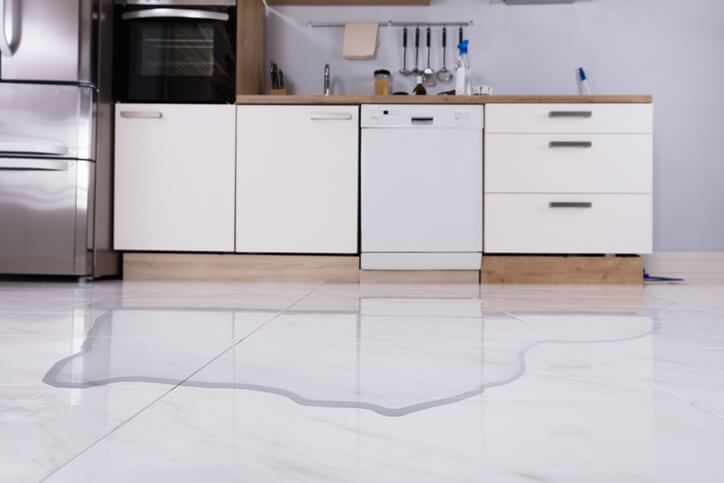Water damage is one of the most common causes of property damage.
You wouldn’t expect your refrigerator to ruin your kitchen and floors, or even destroy support structures in your home, but it’s actually possible.
Home water damage can be caused by leaking fixtures and appliances or faulty pipes and hoses. These leaks can range from a trickle that can cause harm over time, to a sudden burst that can cause immediate impact to your home.
Luckily, with a few simple precautions provided by The Hartford, you may greatly reduce the chances of water damaging your home.
How Do I Prevent Water Damage?
We often forget just how much high-pressure water is flowing through our homes for use in cooking, cleaning and sanitation. Just one compromised conduit could result in heavy damages. That’s why it’s essential to make sure your home is as safe as possible from water damage and that you know what to do if an accident occurs. With just a few routine checks, you could help prevent catastrophe.
Here are some steps to help you easily protect your home from water damage:
- Check Your Appliances. Appliances are capable of causing water damage that ranges from damp and moldy carpeting to ruined hardwood or—if left unchecked—possibly even devastating structural damage. You’ll want make sure to inspect:
- Washing machine
- Dishwasher
- Water heater
- Air conditioning units
- Refrigerators
- Be sure to check the hoses on your washing machine and refrigerator at least annually. If there are any cracks or bulges in the hose, you should have it replaced immediately. Regardless of the hose’s condition, it should always be replaced every five years.
- The entire refrigerator unit should be inspected annually to ensure that other piping isn’t compromised and at risk for causing a leak. Often times, leaks can go unnoticed and seep into support structures. A plumber will know where to look to make sure that there are no leaks in or damage to the unit.
- It’s also smart to check your AC units regularly. Window units will often drip water onto the outside of your house or on your yard. During times of increased usage, such as the spring and summer, you’ll want to ensure that this dripping isn’t causing degradation to the outside of your house, or causing a buildup in your yard that could seep into your basement or ground floor. If you have a central air unit, you’ll want to check the drain lines to make sure that they aren’t clogged. A yearly check should be enough to catch any clog before it becomes severe.
- Protect the Heating and Plumbing. You should make sure that your water heating unit is installed near a floor drain to mitigate any leaks. If your floors don’t have drains, you can place a small, submersible pump near the water heater. This submersible pump will turn on if it senses water and begin pumping that excess water into a portable container. This may help lessen the severity of any damage from a leak that occurs before you’re able to find a professional to service the heater. Any plumbing should be inspected annually, but here are some simple steps you can take to maintain its integrity and reduce the chances of a leak:
- Remove any hoses or attachments from outdoor spigots in the winter to prevent pipes from freezing and cracking.
- Never hang anything from a pipe as this will compromise the joints and supports.
- Add insulation to pipes in areas of your home that get cold easily (garage, basements or crawl spaces).
- Install shut-off valves for all appliances and fixtures to stop the flow of water during an accident and to make repairs easier.
- Soften Water to Avoid Mineral Damage to Plumbing and Appliances. Homes with hard water need to be especially careful to prevent damage to plumbing and appliances. Minerals from hard water (particularly calcium and magnesium) can bind themselves to the interior of pipes and create blockages. In addition to creating jams, they can also eat through the piping, creating small holes that will leak and eventually cause the pipe to collapse. These minerals can also cause serious damage to appliances, destroying hoses and corroding metal, which can ultimately lead to water leakage. You can soften the water in your home by installing a water softening device in your plumbing system. This device will release non-hazardous chemicals into your water that will help fight against the calcium and magnesium buildup. Because one of the main chemicals used to soften water is sodium, it may be wise to keep your “softened” water separate from your drinking water.
A Leak Has Occurred—Now What
Imagine you come home from a week-long vacation only to find an enormous puddle of water encircling your refrigerator. The water covering your kitchen floor has leaked through the floor and into the basement. Worst of all, there is still water coming out of the refrigerator. What should you do?
- Shut off the flow of water.
- Report the claim.
- Deeley’s claims team will guide you every step along the way. As your independent agent, we’ll do our best to work with the insurance company, restoration contractors and other parties to make your claim experience a smooth one.
- Contact us by phone at 410.213.5600 and we are happy to talk you through the process.
- You can even report your claim online.
- If you need to report a claim after regular business hours, we are available to you 24 hours a day on our emergency line 443.523.6472.
- Deeley’s claims team will guide you every step along the way. As your independent agent, we’ll do our best to work with the insurance company, restoration contractors and other parties to make your claim experience a smooth one.
Full article: The Hartford – Water Damage | Mitigate the Destruction








